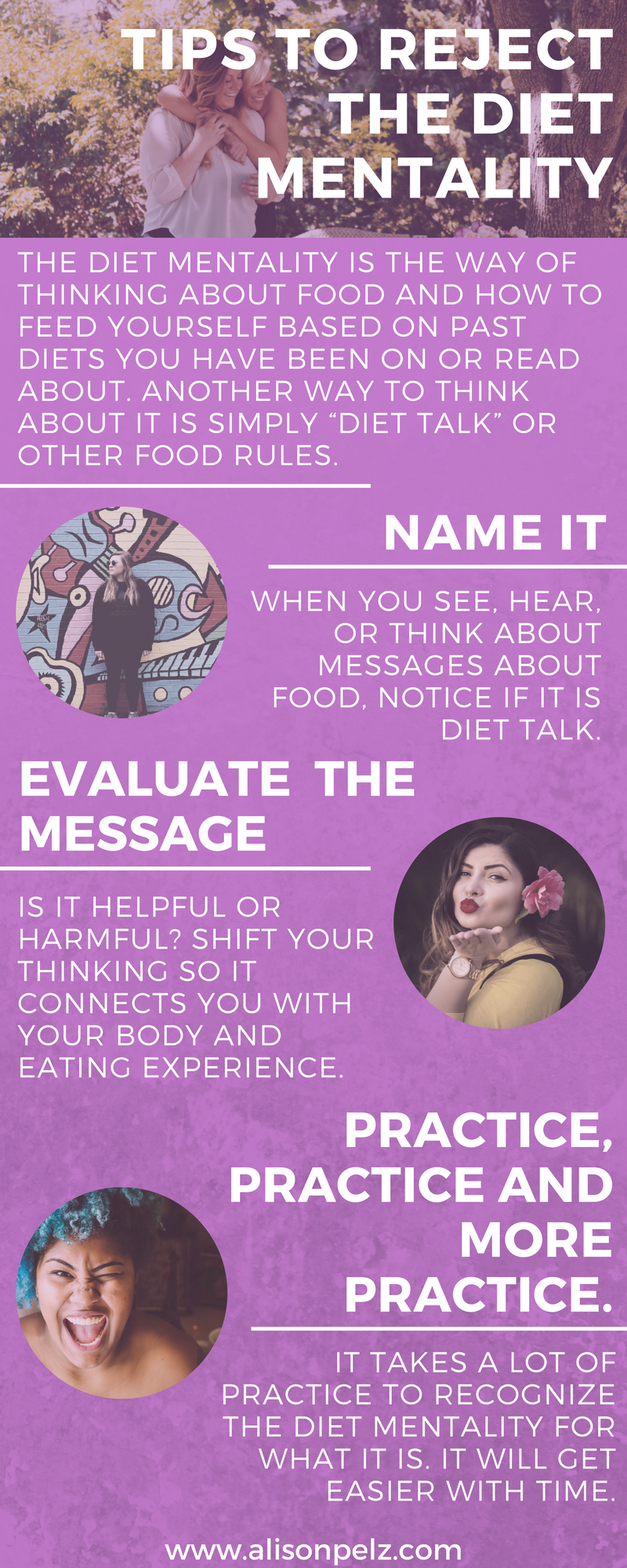We are inundated with messages about what to eat and what not to eat. This is not a new phenomenon—it has been happening since at least the 1970s (if not earlier). With the internet and social media at our fingertips, we are receiving diet advice from so-called experts constantly.
In spite of all this, Americans’ relationship with food seems more screwed up than ever. This plethora of diet messages leaves us even more confused about how to feed ourselves. Diet messages leave us feeling guilty or ashamed of food choices as if we broke some moral code.
If you struggle with food or have a full-blown eating disorder, my guess is that you have been on at least one diet, if not several. Dieting – or the diet mentality – is the real culprit behind eating problems.
The downside of dieting
There is good evidence that dieting doesn’t work for weight loss, and some studies show that dieting leads to weight gain, problematic eating behaviors (such as binge eating), and problematic exercise behaviors. Dieting is a risk factor for developing an eating disorder. Dieting erodes self-esteem and physical and mental health.
Only about 5% of dieters can keep lost weight off. Remember: it’s the diets that fail, not the people on them. Diets are an ineffective (and in some cases dangerous) prescription for weight loss and health.
Dieting gets in the way of our innate ability to feed ourselves. Diets ask us to drink liquid shakes, eat at certain times (no matter if we are hungry or not), eat foods that we may or may not like, oversimplify foods as either “good” or “bad,” and count calories or grams. They don’t take into consideration our culture or bank account.
Diets disconnect us from ourselves.
What is the diet mentality?
The diet mentality is the way of thinking about food and how to feed yourself based on past diets you have been on or read about.
Another way to think about it is simply “diet talk” or other food rules.
The diet mentality can be that inner voice that says, “I shouldn’t eat that. It will make me gain weight,” or “I am only eating clean.” Or it can be that well-meaning fitness instructor who says, “We are burning off all those extra calories we ate over the weekend,” or Aunt Susan stating at Sunday dinner, “I have been so good today. I can have a slice of pie.”
Rejecting the diet mentality allows us to connect with the intuitive eating ability we are all born with, in order to reconnect and heal our relationship with food.
Tips for rejecting the diet mentality
Name it.
When you see, hear, or think about messages about food, notice if it is diet talk. Here are some examples of the diet mentality:
- “I shouldn’t eat after 8 pm.”
- “Don’t eat anything with added sugar.”
- “Running for 30 minutes burns off so many calories.”
In these examples, do you see how these messages are blanket statements that may or may not apply to you? The kicker is that once one of these diet rules is “broken,” you are left feeling guilty and bad about yourself. Never mind that you were hungry and hadn’t eaten since lunchtime.
Evaluate whether the message is helpful or harmful.
Diet rules were intended to help us in our relationship with food, but as stated above, they do not actually do this.
- Does your diet get you where you want to be?
- Does it leave you feeling good or like crap about yourself?
- Does the thought help you feed yourself the way you want to on a routine basis?
- Would you feel confident giving this advice to a dear friend?
Thoughts that may be more helpful include, “If I eat red sauce, I most likely end up with heartburn” or “When I overeat, I feel physically uncomfortable.” These thoughts provide detailed information about how to feed yourself. They connect you with your body and eating experience.
Practice, practice and more practice.
It takes a lot of practice to recognize the diet mentality for what it is. It will get easier with time, and there is no problem with seeking help if you need it.
For more information on how to reject the diet mentality, check out Intuitive Eating or schedule your consult today.


